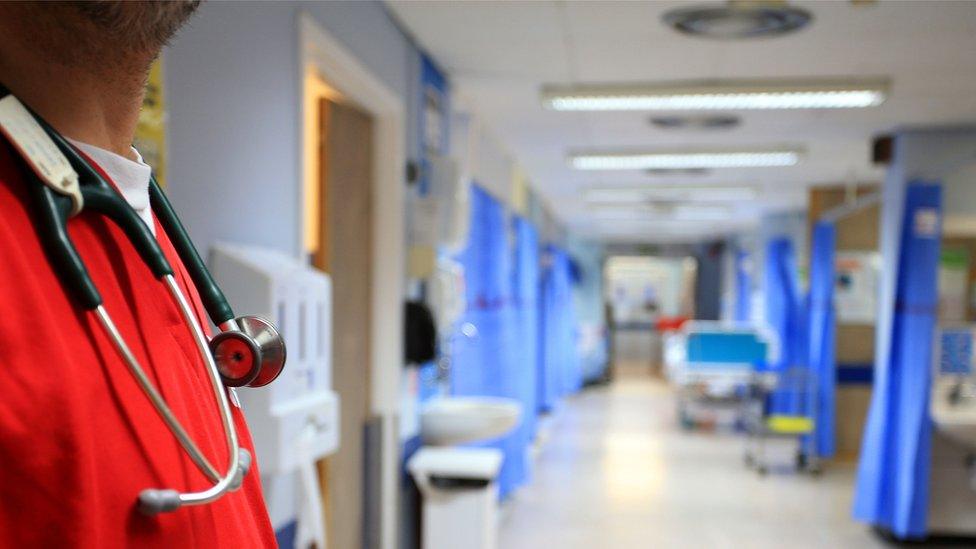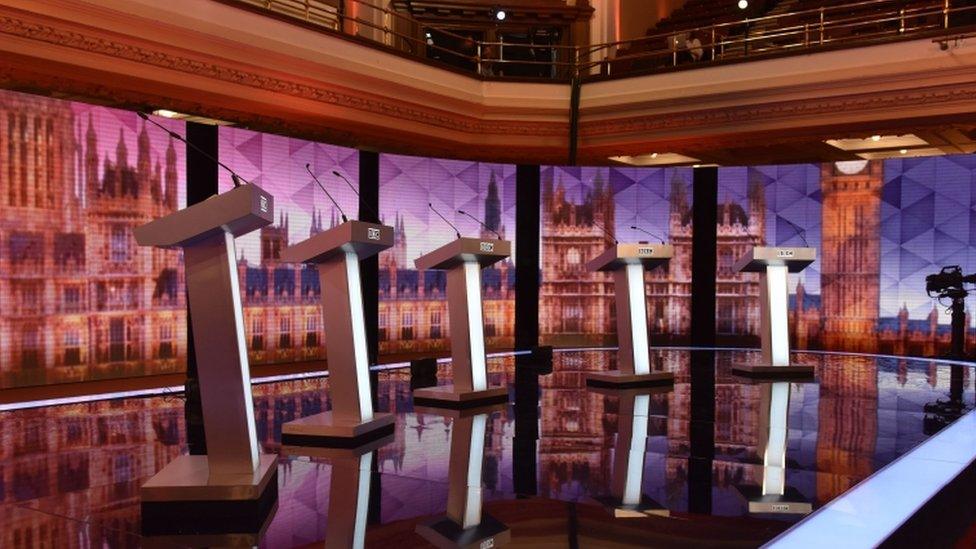EU referendum: Brexit 'could boost NHS by £100m a week'
- Published

Leaving the European Union could allow the government to spend an extra £100m a week on the NHS by 2020, leading Brexit campaigners have said.
Justice Secretary Michael Gove called on the government to pledge the money in the event of an EU exit - saying it could come from the UK's EU budget.
It came after Mr Gove took part in a televised Q&A, urging voters to "take back control" from "Europe's elites".
The PM said the Leave campaign was writing cheques it knew would bounce.
David Cameron said: "Nine out of 10 economists say there'll be a profound shock if we leave the EU. That means there will be less money - not more.
"It's also why so many doctors and nurses support remaining in the EU."
The UK's EU referendum takes place on 23 June.
'Cash transfusion'
The Leave campaign's funding claim came in a statement from Mr Gove, Conservative MP Boris Johnson and Labour's Gisela Stuart, who chairs the Leave campaign.
They said: "As our population grows, and as we all live for longer, so the pressures on the NHS are set to grow.
"One of the best ways to protect, and to strengthen, the NHS for the people of this country is to use some money we currently spend on EU membership to invest in improving healthcare."
If the country votes to leave on 23 June, they said: "The government should use some of the billions saved from leaving the EU to give at least a £100m per week cash transfusion to the NHS."
Leave campaigners said that money would be over and above the prime minister's election commitment to an £8bn real terms increase in spending.



Another Leave campaigner, former Defence Secretary Liam Fox said it was not xenophobic to believe that if you increase the population by three million every 10 years public services would be affected.
"It becomes very difficult for local authorities to plan how many school places are going to be required and it's very difficult for the NHS to know how many doctors and nurses will be required," he said.
Meanwhile, all six living former Labour leaders have issued a plea for the party's supporters to vote to remain in the EU.
In an open letter, released by Britain Stronger in Europe, Lord Kinnock, Dame Margaret Beckett, Tony Blair, Gordon Brown, Harriet Harman and Ed Miliband warned if Labour voters stay at home "Britain leaves".
"Only Labour can save Britain from Brexit," they said.
On Friday, Mr Gove took part in a live Sky News interview, arguing the case for Brexit. He said leaving the EU would lead to more jobs, a "non-racist" immigration policy and would allow the government to help struggling industries.
It followed Thursday night's show which had a similar format but featured Mr Cameron, who is campaigning for Remain.
Mr Gove criticised the prime minister's performance, describing it as "depressing" and "an exercise in trying to scare you".
The justice secretary described the EU as a "job-destroying machine" and said leaving would boost wages, but he also admitted: "I can't guarantee every person currently in work in their current job will keep their job."
Challenged on the lack of international leaders and organisations backing the Leave campaign, he said the public had "had enough of experts... getting it consistently wrong".
He was also pressed on his campaign's controversial claim that £350m a week is spent on the EU.
Questioned on the figure, Mr Gove said he was "happy" to have the claim independently audited and described it as "the difference between the total amount we hand over and what we get back".
The important thing, he said, was "we don't have control of that money".
Shadow justice secretary and Remain campaigner Lord Falconer said the interview was a "lost opportunity" because Mr Gove had not explained "the economics of leaving".
Meanwhile Nobel Prize-winning economist Professor Amartya Sen warned Europe was likely to act like a "jilted suitor" if Britain left the EU.
He said the Vote Leave argument that Britain could flourish outside the EU was "simply mistaken" and was based on "pretty bad economics".
Earlier on Friday, JP Morgan warned it may have to cut up to 4,000 UK jobs in the event of Brexit.
The Electoral Commission said polling cards had been wrongly sent to at least 3,462 EU citizens who were ineligible to vote in the EU referendum.

What TV debates are planned, and when?

BBC:
A live event at Wembley Arena on 21 June with representatives of both sides of the EU debate questioned by voters. David Dimbleby, Mishal Husain and Emily Maitlis to present.
Two special editions of Question Time, moderated by David Dimbleby - with Michael Gove on 15 June in Nottingham and David Cameron on 19 June in Milton Keynes
A young voters' show from Glasgow was held on 26 May, presented by Victoria Derbyshire
ITV
David Cameron and Nigel Farage will in turn answer questions from a studio audience in a live programme on 7 June
Live TV referendum debate between figures from both sides of the campaign on 9 June. Line-up yet to be announced
Sky
Two live shows featuring David Cameron on 2 June and Leave campaigner and Justice Secretary Michael Gove on 3 June
Each show includes a face-to-face live interview and a question-and-answer session in front of a studio audience
Channel 4
Debate on 22 June, the day before the referendum, featuring "politicians, opinion formers and other high-profile pro and anti-protagonists"
